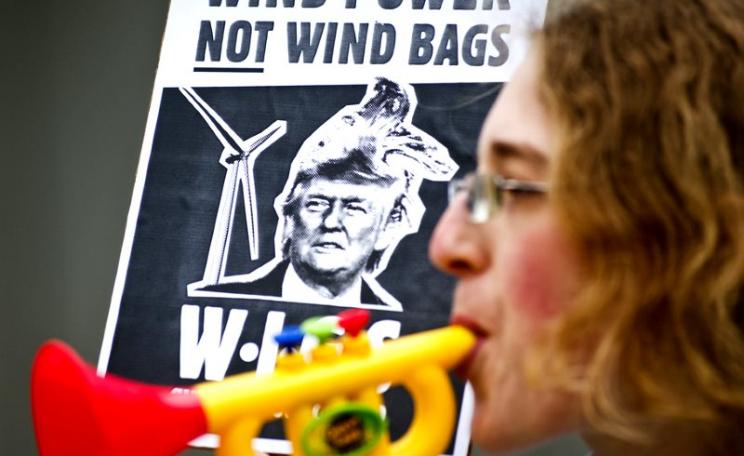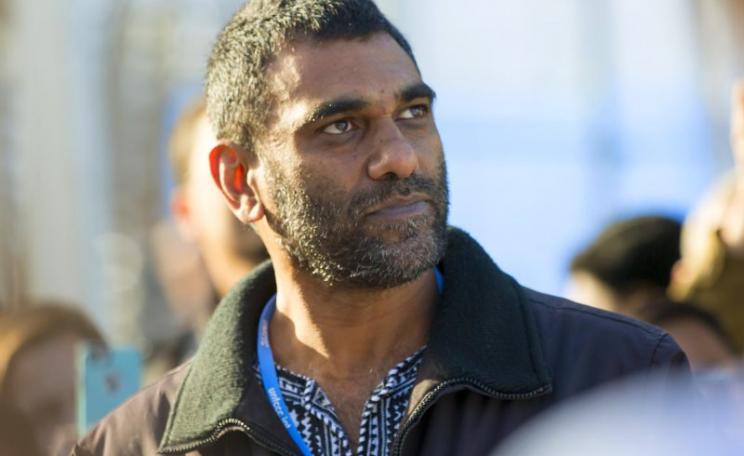What if the Christian community put our money where our hopes and prayers are? Could we be part of a '21st century exodus' of capital, out of fossil fuels and into bringing about the cleaner, safer world we need?
Last November, London hosted the largest march against climate change in British history. My part was to help put together an interfaith event beforehand.
As ever we were nervous about whether people would turn up so early. Soon enough our concerns were the opposite.
The room was full, long before the start time, and by the time our invited rabbi, preacher, sheikh and Buddhist teacher rose to speak, people were overflowing out of the door and down the steps.
The date also marked the finale of a smaller group's 'Pilgrimage to Paris'. They had set out from London, by foot, a fortnight before, intending to join a global march in the French capital, coinciding with the start of the climate talks. That march was cancelled in the wake of the Paris attacks. But the pilgrimage carried on.
The climate summit itself concluded with the historic agreement that temperature rises must stay below 1.5C. The fact that actual commitments put us closer to 3C or 4C took the shine off the announcement somewhat. But it also set us a challenge: We have a few years to ratchet up these commitments. And with the right action we can.
The politics of power
Working out what that right action is requires a frank evaluation of why it is that after 21 years of international negotiations we are still not yet on track for the shift to the bright renewable future we need.
Part of that requires recognising - as the former UN climate chair Christiana Figueres wrote before the summit - that 'Conference of Parties' negotiations are not where global decisions are made, so much as where the shifts that have taken place in national discourses and economies are confirmed.
Christian Aid has long argued that climate change is a catalyst of poverty, and poverty is the result of the inequality of power. While fossil fuel companies continue to exert disproportionate power in our political systems, our economies, and even our culture, we can expect them to do so in the climate talks as well, to the detriment of voices from the most affected countries of the global south.
According to a 2013 study, 90 fossil fuel companies are responsible for two thirds of all carbon emissions since the dawn of the industrial age. According to another, such companies can burn only 20% of existing fossil fuel reserves if temperature rises are to remain within the agreed levels.
Those companies rely on our economic consent. If companies don't have the money to extract fossil fuels, they will have to leave them in the ground. Yet through a variety of routes, our money is still being used, against our wishes, to keep the fossil fuels flowing.
What if the Christian community put our money where our hopes and prayers are? Could we be part of a '21st century exodus' of capital, out of fossil fuels and into bringing about the cleaner, safer world we need?
What if, we wondered, the Christian community put our money where our hopes and prayers are? Could we be part of a '21st century exodus' of capital, out of fossil fuels and into bringing about the cleaner, safer world we need?
Divestment at the heart of action
Grassroots Christians have been working on this for a few years, most notably by asking their churches to remove their investments from fossil fuels, encouraged by the ecumenical campaign group Operation Noah.
The Methodist Church, Church of England, Society of Friends (Quakers), and URC in Scotland have all announced the beginnings of their divestment journeys so far, with more denominations in the process of deciding their approaches.
Taking into account secular and religious institutions together, more than $3 trillion has now been pledged to be moved out of fossil fuels around the world through divestment, up from $2.6 trillion last September.
Christian Aid joined the money-moving action last September with the launch of a new climate campaign; the Big Shift. We began with a call on the UK Government to put an end to finance for coal extraction abroad, whilst phasing out coal burning for electricity at home.
We made an early step forward when Energy Secretary Amber Rudd announced the phase-out of coal power stations in Britain by 2025 (it has previously only been a 'prediction'), although the concurrent announcement the country would rely on gas instead is a significant cause for concern. We are still waiting for the announcement on finance for coal extraction abroad.
It isn't only our institutional investments and our taxes that flow in part to fossil fuel companies though. Except for those who already use green suppliers, most of our energy bills represent the major income source for fossil fuel giants. Especially in the case of churches, these bills can be quite substantial.
There's no reason electricity needs to come from fossil fuels. Indeed for a few months last year renewable energy outperformed coal power generation. But the transition needs to speed up, if the country is to proceed in line with the science.
Churches are part of the low carbon transition
With this in mind, to mark Ash Wednesday (the first day of lent), Christian and Aid and Tearfund teamed up to launch a new stage of the campaign we called the 'Big Church Switch' inviting churchgoers to love their neighbour through their energy bills. The take-up has been phenomenal.
Although the campaign will run all the way until the Papal Day of Prayer for the Earth in September, by Easter Sunday more than 400 churches had already joined, totalling more than a million pounds with which to negotiate a renewable tariff to switch to. We're expecting that for many the price will be lower than what they are paying at the moment.
One of the joyful things about the campaign is the way different organisations have found the ways to participate that work for them. For example, in addition to the website sign-ups, the Catholic organisation CAFOD has set the target of going from 50% to 100% of Catholic Dioceses powered by renewables by 2017. The Quakers have set up a special tariff with the company which they discovered 100 local meetings (about 1 in 4) are signed up with already.
Where the campaign goes next will be decided by a mixture of the participants and who comes forward. Should the campaign extend to other faith communities? To businesses? To sports clubs? Would you like to run a similar campaign to support your sector to switch? If so let us know and we'll share what we've learnt so far.
For all this though, whilst faith communities are beginning to play their part, we accept that we are still only early in our journey of disentangling ourselves from fossil fuels, and indeed that to fully declare our freedom will require the global transition to renewable energy we are trying to catalyse.
A precursor to this must of course be a big shift in awareness. And on this, the indications are looking good. In just the past year, we have had
- Pope Franis's encyclical on climate change, in which he stated, "We know that technology based on fossil fuels ... needs to be progressively replaced without delay."
- the Archbishop of Canterbury's Lambeth Declaration on Climate Change;
- and a poll by the Evangelical Alliance showing a massive 96% of respondents feeling a God-given duty to care for the environment.
We recognise we need a big shift for a safe climate, and we know that's a big ask. We hope though, that we are beginning to rise to the challenge.
Tim Gee is an author and activist and works for Christian Aid.
To contact the Christian Aid campaigns team email [email protected].




